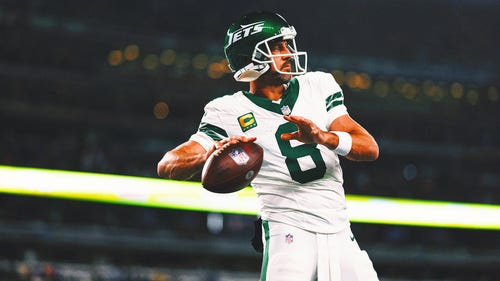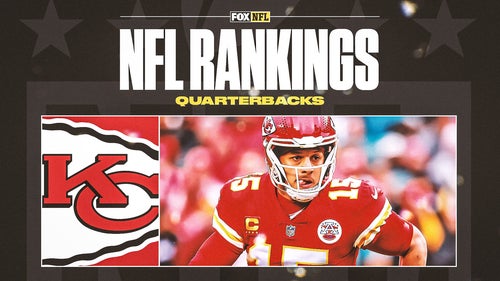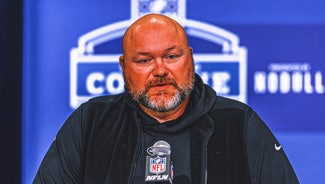
The Greatness We Witnessed in 2016
Greatness takes many forms. It can come in a flash of physical genius, or reveal itself slowly over time. It can be immediately evident, or only apparent upon reflection. It can be observable or intangible. And it is, of course, subjective. So the list below is far from exhaustive. What greatness did you see in the NFL this year? Let us know at talkback@themmqb.com.
Fleeting Fortune
JANUARY 24 — Panthers corners Bene Benwikere and Peanut Tillman may have been on two legs— total—on the night of the NFC Championship Game, but that wouldn’t stop either of them from dancing the clock down to zero on their crutches, as their teammates were making the final arrangements for Santa Clara and Super Bowl 50.
The two injured vets’ excitement was more than just being caught in the moment. It was a symbol of how glued-together the Panthers were, and how unshakable their foundation seemed to be at around 10 p.m. local that night.
“It’s the standard that’s been set from the top down,” Jared Allen told me about a half-hour later. “This is the way you do things—it’s team, team, team, team. You’ve got guys that buy into that, and you’ve got the right leaders and right personalities, because for someone to say something to someone, and someone to correct someone, somebody has to be willing to be corrected by someone without holding a grudge. Guys genuinely have each other’s back, and are for the greater good of the team. It’s a special place.”

The assignment is here to recount the greatness we witnessed in 2016. And to me, the story of where the Panthers were back on Jan. 24 is perfect for that. Because in the moment, for a team that was 17-1 and had just steamrolled an Arizona group that came in 14-3, there was true greatness there. But also because it’s a lesson in how fleeting that greatness is in the NFL.
That seemingly unbeatable freight train was derailed two weeks later by the Broncos. Last year’s league MVP, Cam Newton, has a worse completion percentage in 2016 than Blake Bortles, Robert Griffin III, Jared Goff and both the Niners’ mediocre QBs. Carolina’s First Team All-Pro corner, Josh Norman, is now a Redskin. The team’s leader, Ron Rivera, is suddenly the subject of coaching-carousel rumors.
Luke Kuechly’s been sidelined with a serious concussion, the front seven isn’t what it was, and the Panthers now rank 22nd in total defense. Similarly, Jonathan Stewart—the engine behind the league’s second-ranked run game in 2015—hasn’t been able to stay healthy, and the 2016 Panthers are just 12th in that category.
And on Sunday, the Panthers will look to avoid a 10-loss season in Tampa, where they’ll face one of three teams they’re looking up at from the NFC South basement. Oh, and Benwikere—a valuable piece early on for the 2015 Panthers—is now out of football, first cut by Carolina in October, then by Miami in November. And Tillman is working for Fox.
That doesn’t minimize the greatness I witnessed on that January night in Charlotte, of course. In fact, to all those guys who were there, it probably makes it mean even more. —Albert Breer
* * *
The Deal You Don’t Make
APRIL 28 — Sometimes greatness is an accident. Greatness was an accident in Dallas last spring, on the weekend of the NFL draft, when the Cowboys cursed their scouting luck, then ended up hitting a grand slam 109 picks later, a grand slam no one could have foreseen.
In the Dallas draft room, owner Jerry Jones and his scouting team already had one top player in the fold—running back Ezekiel Elliott, with the fourth overall pick. Now it was later in the round, and the Cowboys were scrambling to trade up for Memphis quarterback Paxton Lynch. Between 9:25 p.m. and 9:45 p.m. Central time, draft czar Stephen Jones had three conversations with Seattle. Jones started with a simple swap offer: Seattle would send the 26th pick to Dallas, with Dallas returning a two and and a four. No interest. So Jones called Cincinnati, picking 24th. No interest.

Pall in the draft room. Jerry Jones stood at the board near his seat, silent, trying to figure out anything that could tempt a team picking in the 20s.
Stephen Jones called out: “Anything else? Want me to try something else?’’
No answer.
At 9:54 p.m., Seattle GM John Schneider was back on the phone. Quick call. “No way with Seattle,” Stephen Jones reported. “They want our two and our three.”
Jerry Jones could have trumped Stephen. It’s Jerry’s team. He thought about it.
“Thoughts?’’ Stephen Jones said to his father. “Any thoughts?’’
They had a minute, maybe, to up the offer to Seattle, which was the only fish on the line. Jerry Jones stared at the draft board. Silence in the room.
A minute later, maybe two, Denver consummated the deal with Seattle for the 26th pick. The only way Dallas could have made the deal: by including its high third-round pick, 67th overall. The Cowboys refused—with some significant regrets. But they refused nonetheless.
“Lynch,’’ someone in the room said. “Denver’s picking Lynch. It’s over.”
Silence, black-crepe-paper silence, in the room.
Two days later the Cowboys, with zero fanfare, selected Dak Prescott in the fourth round, the 135th overall pick.
Lynch has been a season-long backup for Denver. Prescott has morphed into a serious NFL MVP candidate. The moral of the story is one that franchise architects have been learning for decades: Sometimes the best deals are the ones you don’t make. —Peter King
* * *
Inside the Mind of Gronk
AUGUST 7 — For a feature story in The MMQB’s special edition of Sports Illustrated magazine, I had sold my editors on a story about Rob Gronkowksi as the smartest tight end in football. That’s right—not just the most gifted, but also the smartest. I honestly didn’t know if it was true. I suspected it was, based on how the Patriots used him. But I still needed to find out.
Gronkowski and I met in a small breakroom at Gillette Stadium, sitting across a table from one another, interrogation style. I grilled him on every imaginable nuance of playing tight end, clear down to, “What do you do to set up a skinny post if you’re aligned out wide on the painted field numbers? How about if you’re aligned two yards inside the painted numbers?”

They were the types of questions that could easily annoy. But Gronkowski became more enthused with each one. There was nothing he didn’t expound on. Gronkowski is one of those guys who is much bigger in person than you’d guess. His hands come from a claw tractor. His shoulders are something you could construct an upstairs bonus room on. And yet, on the topic of his craft, everything he spoke of pertained to the mental details of the game. Never once did he mention running by or through a defender. It was all about setting them up and exploiting favorable angles and leverage. He told stories about his learning process, about how harsh Tom Brady was on him “back in the day” when his route-running was a little imprecise. He explained how subtly but significantly his techniques can change based on the game’s situation.
The experience was an illustration of how raw physical talent, while vital, is just an ingredient in the recipe for greatness in the NFL. There’s a rich intellectual aspect to it. —Andy Benoit
* * *
K.C. Cool
AUGUST 18 — Every summer, we at The MMQB embark on a training-camp tour. Each stop is brief, but you always leave with a feeling about a team. Sometimes, those feelings prove to be way off (the 2016 Arizona Cardinals). In other cases, they bear out.
Take the Kansas City Chiefs. I went to the campus of Missouri Western the day the Chiefs were breaking camp. It had been a quiet camp, in part because with the Rams relocating to Los Angeles, the Chiefs were all alone in the middle of Missouri and not an easy stop for national media. The Chiefs were firmly under the radar, but around the team there was a sense of quiet self-confidence. The Broncos were the defending Super Bowl champs and the Raiders were gearing up to take a leap forward, but the Chiefs really felt this was the year to win the AFC West and make a deeper postseason run.

The timing made sense. Andy Reid’s fourth season as head coach, and fourth with QB Alex Smith. GM John Dorsey described “an ease” about Smith as he had his best camp yet. The Chiefs had questions about some of their stars—injuries to Jamaal Charles, Tamba Hali and Justin Houston—but boasted a deep roster. But the biggest reason for confidence? The previous season, in 2015, the Chiefs notched their first postseason win since 1993. “Once we got past the Houston game with a victory, that was a big win for the organization,” Dorsey said this summer. “Because it reestablished that we can win in the playoffs. It wasn’t the pessimism of, here we go, we are in the playoffs, we are going to lose again.”
Smith, on his own, made the same point. “I saw it in San Francisco before,” he said. “I am a huge believer, especially as young as we are, for these guys to win a playoff game, and then go to the next round, and there’s only a couple teams left playing. … Once you have tasted that, and what that’s like, it puts this thing in the back of your brain, you want to get back in and playing in even bigger stages.”
With one week to go, the Chiefs are 11-4, postseason-bound again, and have a chance to win the division in Week 17 if they beat the Chargers and the Raiders lose at Denver. Last season ended for the Chiefs with a divisional-round loss in Foxboro, and with the same hurdle looming, what happens these next few weeks will determine if the Chiefs have really taken another step forward. But what’s stuck with me all season is that quiet self-assurance that was so pervasive on the campus of Missouri Western. They truly believe this is their year. —Jenny Vrentas
* * *
Prescott’s Promise
SEPTEMBER 11 — I was in Jerry Jones’ private owners box for the first drive of the Dak Prescott-Ezekiel Elliott era. Jones sipped on unsweetened iced tea and sat between his two sons and leaned forward in his seat, curious. Remember, Tony Romo had just broken his back, and the Cowboys’ season was supposedly over, and Prescott was just another fourth-round pick.
Jones watched quietly as Prescott marched the Cowboys into the red zone on the Giants, whose defense would later be recognized as one of the best in the NFL. Prescott zips a pass to Jason Witten for 17 yards. Then he finds Cole Beasley for six yards, and again for nine. On the drive, Prescott completes six of seven passes for 49 yards. Stephen Jones pumps his fist, Jerry Jr. comments to his father about how patient Prescott looks, how poised in the pocket.

The drive stalls in the red zone, and the Cowboys settle for a field goal, and Jerry Jones curses loudly. But what else could you expect from a rookie on his first-career drive?
A few hours later I was down on the sideline, behind the Giants’ bench, as Prescott took over at his own 20-yard line, trailing by one point with 65 seconds remaining and no timeouts. Prescott checked down to Lance Dunbar, who scampered for 16 yards. Then Prescott converted a third-down to Beasley for 15 yards. On the Giants’ sideline, Odell Beckham Jr. paced by himself, not watching the action. Then, with 12 seconds left, Prescott completed a quick out to Terrance Williams, and instead of getting out of bounds, Williams tried to get extra yards and slid down at the Giants’ 40. Prescott tried racing to the line to spike the ball, but the clock ran out, and Beckham and the Giants rushed the field like a college team.
“I thought [Prescott] lifted our play,” Jerry Jones told reporters afterward. “We had high expectations. I thought he met and exceeded the expectations.”
Little did Jones know the greatness he would witness in the weeks to come. —Tim Rohan
* * *
‘Please Just Block Khalil Mack’
NOVEMBER 27 — The greatest thing I witnessed in 2016 was the climax to a game I wasn’t even attending. It was Week 12, and I left my home in Denver to cover Chiefs at Broncos in the frigid cold while the Raiders-Panthers game was still going on television. Carolina was clawing at relevance, having won three of its last four after dropping five of its first six. Oakland was rolling, on its way to a first AFC West championship since 2002.
As I walked through the parking lot at Mile High, I realized that every tailgate with a television was tuned to Raiders-Panthers. They were all rooting for Cam Newton, probably for the first time since Denver ended Newton’s MVP season with a Super Bowl defeat. An Oakland win would make that evening’s Broncos game even more of a must-win. I stopped and ducked into a tented tailgate with a television as a Broncos fan said out loud, “Please just block Khalil Mack.”

Mack had returned an interception for a touchdown to put the Raiders up 24-7 at the half, but now the Panthers had the ball at the Oakland 44 on fourth and 10, down a score. This was the kind of pressure Newton thrived under only a year ago. But the fan just kept muttering: “Please just block Khalil Mack.”
As if on cue, Mack blew past the tackle and in one motion knocked the ball from Newton’s grasp and recovered the fumble. Groans filled the tailgate. “I knew it!” the Broncos fan shouted. “F------ Khalil Mack.” Later, after the win, Mack would tell reporters that he had told a fellow defensive back just before the play, “All we need is three seconds.” Three seconds of coverage, and Mack promised he would finish the game. It struck me as symptomatic of a certain kind of greatness that the fans of Oakland’s greatest rival had just as much confidence in Mack as Mack did in himself. —Robert Klemko
* * *
Table-Running, in Style
DECEMBER 11 — “I’m hurting man,” Aaron Rodgers told a Green Bay staffer as he hobbled across the Packers locker room, somehow favoring both his left hamstring and his right calf. “I’m huuuuurting.”
Even as his body faltered, the quarterback flashed a familiar smile. It was as if he was telling anyone around him, and all Packers fans, not to worry about appearance. Everything was going to end up just fine.

This was in Week 14, after Green Bay stunned the Seahawks with a 38-10 shellacking to assert themselves as bona fide threats in the NFC. At the time I wondered if the Packers were contenders or just pretenders. Green Bay began the season 4-6. True, they had just rattled off three straight wins, but they were patching their fickle run game by using a converted wide receiver, Rodgers was enduring his regular end of season wear-and-tear, and this victory against Seattle seemed fluky—with a multitude of bounces going Green Bay’s way to aid a leaky secondary.
I couldn’t have been more wrong.
Rodgers, it turns out, fulfilled yet another prophecy—the Packers could run the table, winning out in their final six games, and they would not only make the playoffs, but do so with style. To borrow another phrase from the 33-year-old quarterback, everyone needed to just R-E-L-A-X. The greatness I witnessed this season was the mastery of an elite franchise quarterback. Rodgers proved that, while engineering one of the most impressive second-half turnarounds of recent memory, that one player can set the tone and culture around him. —Emily Kaplan
What were the great NFL moments you witnessed in 2016? Let us know at talkback@themmqb.com.








































































































































